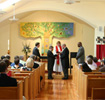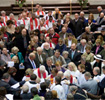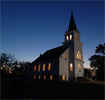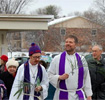
Focusing on the day-to-day
Linda O'Brien
Conrad, Mont. "If [The Bible] isn't the basis for our beliefs, then we are just a Sunday Social club that does good deeds." |
↓ Interview
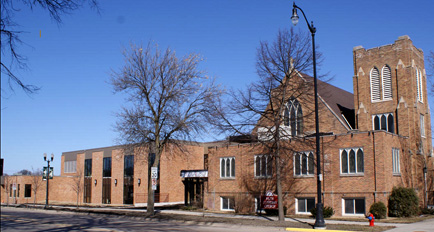 Faith Lutheran Church in Hutchinson, Minn. voted to end its affiliation with the ELCA. (Photo courtesy of Jackie Backen) For many ELCA congregants, last year's vote to allow gay pastors in committed relationships to serve as clergy went along seamlessly with their personal beliefs. But others struggled with the decision, or completely disagreed with it, and ultimately decided it was a divisive enough issue that they had to leave the ELCA. The vote contradicted their reading of the Bible, and confirmed their suspicion that the ELCA was more interested in staying socially relevant than following what they believe is the "inspired word" of God.  Scott Grorud, pastor of Faith Lutheran Church in Hutchinson, Minn. (Photo courtesy of Olan Mills) Faith Lutheran Church in Hutchinson, Minn. is one of more than 200 churches that have taken the two votes necessary to disaffiliate from the ELCA over the vote. Pastor Scott Grorud says the decision to leave the ELCA brought relief to him and his congregation. "The church I serve is flourishing since the vote, just as it was before the vote," he says, noting that his church has worked hard not to change in any significant way. "The changes are happening in the ELCA, which is why we needed to get out of it." To say Grorud's congregation has "left" the ELCA doesn't feel right - not to him. "The truth is that the ELCA has left us," he says. "It has chosen to move into a brave new world of its own making." And it's not necessarily because of last year's decision, according to Grorud, but rather the ELCA's overall "perseveration on sexuality." Christian teaching on sexuality is simple and clear, he says, focusing on faithfulness within marriage and chastity outside of marriage. But he says it's not that the teaching isn't clear, it's that "sinners don't like it and keep trying to change the rules God set up." Grorud says his congregation would love nothing more than to get off this topic and get back to forgiveness of sins in Jesus' name, providing care for the soul, evangelizing a world in "perpetual rebellion against God," and helping those in need. These words also ring true for Linda O'Brien of Pondera Valley Lutheran Church in Conrad, Mont. After last year's vote, more than 85 percent of the congregation voted to leave the ELCA and join the Lutheran Congregations in Mission for Christ (LCMC), but she says it was a decision no one took lightly. The church was torn over the change, debating and deliberating for months. But in the end, she says their loyalty to the ELCA was outweighed by the authority of scripture. She says her congregation truly believes the scriptures are the inspired word of God, and "if that isn't the basis for our beliefs, then we are just a Sunday Social club that does good deeds." O'Brien says leaving the ELCA was painful for the church, but congregants are relieved to be free to worship without this issue on the forefront of their minds. "We have since grown as a congregation; we see new life and are happy with the positive changes that have taken place in our faith community since the decision," she says. The church strives to no longer discuss national church policy, is back to worshipping and praising God on a weekly basis, holding bible studies, bringing meals to the sick, collecting food for the food pantry, and supporting those in need. O'Brien says she is once again serving on her church council, and that she is at peace that her congregation has made the right decision. |
Darin Johnson
San Diego, Calif. "Among young adults who make up most of our community, there is a mixture of gratitude, relief and 'what took you so long?'" |
↓ In their words
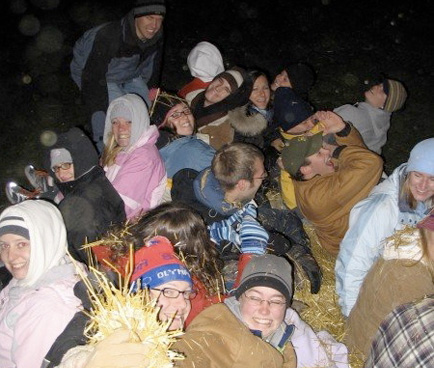 Students in a ELCA campus ministry program run by Darin Johnson. (Photo courtesy of Darin Johnson) Darin Johnson of San Diego runs an ELCA campus ministry program, and has a feel for how young people are thinking through the vote and its impact on the broader church community. "Among young adults who make up most of our community, there is a mixture of gratitude, relief and 'what took you so long?' There is also some sense of pride that now, when we greet people, we can honestly say that ALL people are welcome. "Because of the congregations that stopped supporting extended ministries, on top of the economic recession, funding for young adult and campus ministry has become especially challenging. "At the local level, many congregations are out of touch with young adults and their faith and values. In this relatively older denomination (average age ~56 years), many young adults feel 'invisible' or disregarded when they visit congregations where people want nothing to change until after they are dead and buried. On the other hand, I meet many young adults who are hopeful about the church's future, especially when they see it expanding its vision of what it means to be the body of Christ. "The ELCA is much larger and much more mission-focused than the controversy about sexual orientation." |
In The Spotlight
-
The Current Music Blog
Your daily note for good music, news and pop culture. With attempted jokes.


